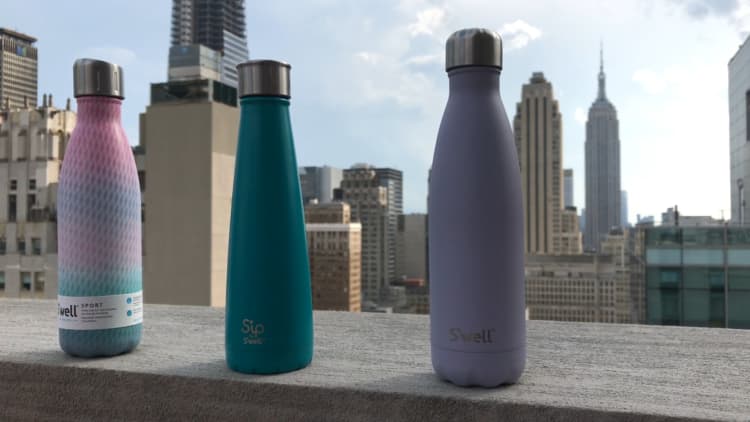When it comes to fashion, brands have always found an eager audience willing to pay for cache and quality. But one company has built its brand on the idea that the next big accessory is something completely different: a water bottle.
Enter S'well, a company that makes reusable water bottles with a sleek design and countless color options at a premium price of $35 for a standard size. S'well says it has sold over 20 million S'well bottles worldwide, all while founder and CEO Sarah Kauss has retained 100% ownership of the company.
Kauss, a former accountant, came up with the idea for S'well after becoming frustrated with the unpolished look of her own reusable water bottle in 2009. "It looked like a camping accessory," she told CNBC Make It. "It didn't look like something I would want to leave on the table."
S'well launched in 2010 after Kauss invested $30,000 of her own money to start the company. She managed every part of the business herself, including going door-to-door to retailers to pitch them to carry her products.
The company's big break came in 2011, when S'well was featured in O, The Oprah Magazine. After the magazine's editors recommended that the company launch more color options, S'well expanded from one color to six; now the company's dozens of designs are one of its major selling points. S'well has also found success not only on its online store, but through partnerships with major retailers like Starbucks, Target and Nordstrom.
Sustainability is also a major part of S'well's brand. Single-use plastic bottles can take hundreds of years to decompose, posing a major threat to the environment. S'well has set a goal to help eliminate 100 million plastic bottles by 2020, by convincing consumers to switch to its reusable bottles instead.
Despite its noble goals, S'well has attracted critics for the high price of its products. S'well water bottles start at $35 and can go as high as $75 for larger sizes. A range of inexpensive S'well competitors have sprung up online for those who want a similar design at a lower price.
But Kauss embraces S'well's luxury image. "When I hear that people are using swell as a status symbol ... I really love that," she said. The company says its insulated stainless steel bottles can keep drinks cold for 24 hours or hot for 12 hours, longer than cheaper alternatives.
Consumers' changing tastes, combined with a growing environmental awareness, have positioned S'well to continue to grow as a brand. In 2016, bottled water surpassed soda as the No. 1 beverage in the U.S., according to industry research group Beverage Marketing Corporation. A report by Grand View Research valued the reusable water bottle market at $8.1 billion in 2018.
The company has also expanded its product line beyond bottles. In August, it launched its own line of reusable food containers called S'well Eats and S'nack by S'well that start at $20.
S'well reported $100 million in revenue in 2016, the most recent year it publicized the data. By branching out into new products, the company aims to capture an even wider market with its re-imagining of everyday products.
"If you can get the trifecta of the perfect timing, the right price point and finding that right customer, then you're going to succeed," Chris Black, partner at brand consultancy Public Announcement, told CNBC Make It. "That's what they've done."



